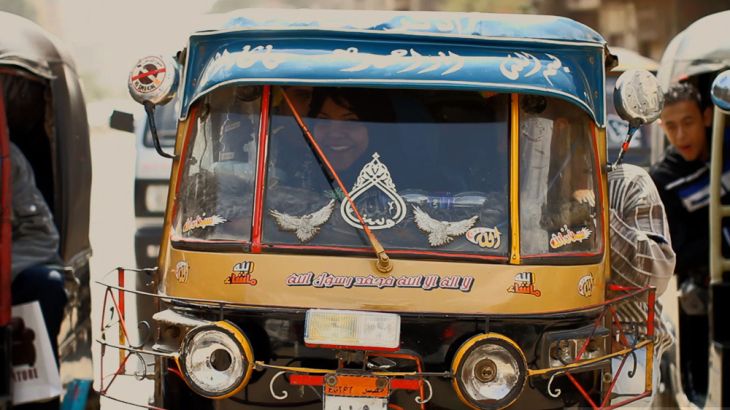
Behind the Wheel: Egypt’s Women Drivers
The stories of four Egyptian women and the different vehicles they drive – from a rickshaw to a 36-tonne truck.
In the heart of Egypt’s bustling capital Cairo, only very few female taxi drivers brave the unforgiving traffic.
Um Waleed is one of them. Driven by force of circumstance and the need to make a living, she went down a road that very few other women in the Arab world would contemplate.
Keep reading
list of 4 itemsTen years after Chibok girls kidnapping: One woman’s struggle to move on
Poland lawmakers take steps towards liberalising abortion laws
Arizona’s top court allows near-total 1864 abortion ban to go into effect
This Egyptian woman has been driving for more than 30 years and first bought a taxi when her father encouraged her as he had no sons. This kind of work is dominated by men – but the discrimination she has encountered along the way has only her made her more determined.
“When I went to the traffic department to take my test, men were making fun of me. ‘Go peel onions and cook cabbage’, they said. This just made me more determined. Their comments and the way they looked at me motivated me even more,” she says.
Um Samah’s husband used to drive a minibus but was diagnosed with glaucoma. Hiring someone else to work the bus was more trouble than it was worth, so she started driving without a licence. After a run-in with the police, she was later able to pass her driving test and now drives the bus legally.
She wouldn’t want any of her children to do what she has done because it is so tough, but she has no regrets: “If I could go back in time, I’d do the same thing. This is the only work I can do … I like my job but sometimes I cry, tears run down my face while I drive, because I didn’t stay at home like other women do,” she says.
Dalia is 20 and decided to drive the family auto-rickshaw because her younger brother was being bothered by other drivers. She drives wearing an abaya to try and cut down on harassment – but that doesn’t stop other drivers trying to run her off the road.
“It’s not the driving itself. The problem is the people. A day doesn’t go by without fighting. I face about 20 fights a day,” she says. Away from work, Dalia likes to go to the beauty salon: “I like Dalia when she is not driving the auto-rick because she gets to act like a lady. The Dalia that drives the auto-rick acts more like a man than a woman … I wish I could be a child again and make a fresh start, to become another Dalia. A different Dalia from the one who drives an auto-rickshaw,” Dalia says.
Um Khaled drives a 36-tonne truck. She was also motivated by the discrimination she felt as a woman taxi driver. Now she says people either love her or hate her. She is proud of what she does and feels more at home in the cab of her truck than she does in her apartment.
She works obsessively, sometimes two months at a time, without taking a day off.
“I’ll never stop as long as I can work. I’ll continue working until God wants me to stop … Not just any woman can drive on these roads. The proof is that we don’t have female heavy-vehicle drivers,” she says.
But she does like to dress nicely off duty: “God made me a woman. I need to take care of the way I look and dress, of my appearance. Deep inside, I know I don’t live my life like other women. But that doesn’t mean I don’t have feminine qualities or that I don’t act, dress, walk and eat like a lady.”
Behind the Wheel follows four remarkable women, battling against the discrimination they experience every day – and constantly trying to reconcile the tension between their working lives and their identities as women.